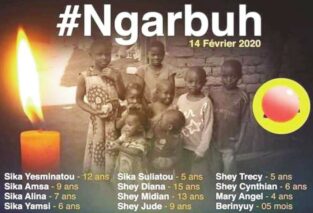(Revised and reproduced from Cameroon Tribune of Friday, January 15, 1988).
When this innocent, comical piece first appeared in the English edition of Cameroon Tribune on Friday, 15 January 1988, it did not earn me many friends in the Nso community. I was accused, among other things, of being an ungrateful son of Nso who had lived outside his community for too long and was now completely alienated from the daily realities of life among my people. What a strange accusation! Looking back at this piece decades later, I still wonder what all the fuss was about. It was meant to be lighthearted. Here is what I wrote that provoked such strong reprobation.
**************
Not long ago, someone was heard in the pages of Cameroon Tribune loudly decrying the widespread habit of handshaking in this country. He complained—rightly so—that when you meet someone you know—for instance, urinating by the roadside (and do Cameroonians ever love to urinate just about anywhere and at any time!)—that person immediately thrusts out a hand still glistening with urine or scrotal sweat for you to shake. Good grief, what a disgusting habit!
The author of that piece has my sympathy. Ever since I read it, I have been expecting students of social behaviour to diagnose and tell Cameroonians whether such hygienically questionable phenomena are likely to lead us down the path to heaven or to hell. But, as usual, if you were to wait for the learned ladies and gentlemen of the academic circles in this country to make a pronouncement on anything of worth, you would wait forever and ever. Amen.
So, instead of waiting for what I knew would never come, I decided to put the Cameroonian society under the powerful lens of my social microscope, just to see for myself what would happen to the social fabric of our dear fatherland if this handshaking madness were to go unchecked. And I made a fascinating discovery.
Had the author of the article in question taken the time to look more closely, he might have seen that all is not bleak on the map of social behaviour in this country. In fact, there is one community in which this handshaking mania may soon become a thing of the past. I know this may come as a shocking revelation even to the Nso people themselves, but when you zoom in on Nso society, you discover that fewer and fewer people are shaking hands with each other these days.
I can hear you wondering why. The answer is simple: traditional titles, once the exclusive domain of a select few, are now widely sought after, with everyone eager to claim one. It seems that every Nso man aspires to become a “Shey,” a “Fai,” a “Shufai,” a “Kibai,” or even a “Fon“—titles that forbid the bearer from shaking hands with ordinary mortals like you and me. At this rate, by the year 2000, three-quarters of the Nso male population may refuse to shake hands with anyone in this peculiar triangular oddity we call Cameroon.
The other day, for instance, I stood in Kumbo Squares and found that nearly eight out of every ten people I spoke with refused to shake my hand. You know how it goes: you encounter a man you once knew as Mr. So-and-So. You eagerly call his name and extend your hand to greet him. The outraged fellow responds with a fury-propelled glare. Then, one of his lackeys—always hovering around in hopes of free drink or food—loudly admonishes you for daring to address someone by name “who has already been spoilt.” In that moment, you understand that this individual has been anointed with the traditional camwood paste, rendering him “untouchable” and “unapproachable” (except, I suppose, by women in the privacy of bedrooms, far from the prying eyes of the madding crowd!).
Even here in Douala, when a Nso man returns home on leave these days, you can almost be certain he will come back as a “Shey” or a “Fai.” If you dare to call him by name or extend your hand to greet him, he will angrily accuse you of trying to “wash” him, and don’t be surprised if he never speaks to you again! However, one might sympathize with him upon hearing about the large sums of money, time, and energy that go into acquiring these titles.
Traditionally speaking—and I stand to be corrected on this point—a “Shey,” “Fai,” or “Shufai” must inherit a “compound” in Nsoland. It now seems that there are many more “Sheys,” “Fais,” and “Shufais” than there are “compounds” to inherit, and many of those without compounds are busily creating their own. That is why it is not uncommon to hear someone claim to be the “Fai” of Mvog-Ada, the “Shufai” of Bonadibong, or the “Shey” of Bayangi quarters! Good Lord, have mercy!
In this mad quest for titles, only the Nso woman appears to come out the loser. Aside from the title of “Yaah” (Queen), which is bestowed on a select few, the Nso woman seems to have no other traditional title that can keep her hand sacred and untouchable—though I understand she can now also be elevated to the rank of a “Shey.” This is truly a man’s world!
Whatever the case may be, whether driven by greed or a genuine desire to escape the rusty grips of a moribund traditional society, the Nso leaders of the late 1980s have, perhaps unwittingly, made a significant contribution to eliminating the unhygienic habit of excessive handshaking in this country. Their secret is simple: award titles to as many people (including foreigners) as can afford to pay for them; then no one would dare shake hands with such title-holders, and diseases typically spread from hand to hand would miraculously vanish. How clever!



